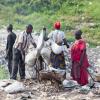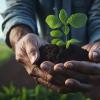
IIASA researchers are participating in a new project kicking off in Uganda this week, in which IIASA and a number of international partners will work with Ugandan stakeholders to co-develop a national strategy for organic waste management in the country.
Organic waste has emerged as a significant challenge in Uganda, especially in urban areas where population growth and urbanization have led to increased waste generation. Despite existing efforts such as composting, biogas generation, recycling, and the implementation of policies and programs to improve waste management practices, challenges remain. Among these challenges are the lack of a national strategy for organic waste management, open waste burning, which releases harmful pollutants into the air, limited public awareness and participation in waste sorting and composting practices, and siloed approaches among stakeholders in addressing organic waste.
The strategy for organic waste management in Uganda project – or SOWU for short – responds to a request made by the National Environment Management Authority (NEMA) and the Ministry of Water and Environment of Uganda. The project aims to support Uganda in developing a strategy for organic waste management that mitigates short-lived climate pollutants (e.g., methane and black carbon) and aligns with the country’s current policies, existing national regulations on waste, and ambitions for the 2025 Ugandan Nationally Determined Contributions (NDC) update.
The project will also enhance the capacity of relevant national and subnational institutions, policy and legal frameworks, and financing options to promote action on waste separation, organic waste diversion from landfills, and the extraction of value from organic waste. The project is funded by the Climate and Clean Air Coalition (CCAC) and is expected to deliver the following three main outcomes:
- A national short-lived climate pollutant mitigation strategy for organic waste that is aligned with the country’s objectives, along with long-term policy recommendations to the national government.
- Raise the profile of organic waste management in an effort to prioritize its funding.
- Provide tools to develop and maintain a reliable monitoring, reporting, and verification framework to monitor organic waste generation management and short-lived climate pollutant emissions, accompanied by an organic waste sorting manual.
The SOWU project brings together an interdisciplinary team led by IIASA, Stellenbosch University (South Africa), and Ugandan policymakers including NEMA, the Ugandan Ministry of Water and Environment and the African Centre for Clean Air, a local non-profit organization, to collaboratively work with local stakeholders.
The launch and inception meeting of the project will take place from 16 to 18 April in Kampala, Uganda.
News

12 December 2023
Giacomo Falchetta receives the IAMC Best Online Poster Award

20 October 2023
Successful joint workshop supports equitable development in rural Africa

03 October 2023

